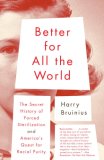Summary | Excerpt | Reviews | Beyond the Book | Readalikes | Genres & Themes | Author Bio
The Secret History of Forced Sterilization and America's Quest for Racial Purity

Critics' Opinion:
Readers' Opinion:
First Published:
Feb 2006, 416 pages
Paperback:
Apr 2007, 416 pages
 Book Reviewed by:
Book Reviewed by:
BookBrowse Review Team
Buy This Book
Yes, our descendants may well be proud. In the end, real progress in
this history, in this quest to battle disease and human suffering, will
be found in our descendants, Dr. Bell believed. This was why he had to
sterilize Carrie, and this was why he was dedicated to the care of
epileptics and feebleminded. To those not familiar with the recent
discoveries of "genetics"—a new term in science—Carrie might have seemed
a normal girl, if sassy and simple and even a little slow. But Dr. Bell
knew she carried within her, like the taint of original sin, the
defective "germ-plasm" she would pass on to her children. A defect in
her genes made her unusually promiscuous, unable to control herself, and
prone to bear a child out of wedlock without shame. It kept her—and her
mother Emma before her—from being a productive, law-abiding citizen. And
he could say with all confidence, too, that Carrie's illegitimate
daughter Vivian, not quite three years old, would follow the same wanton
path.
Yes, our descendants may well be proud. Science was revealing the
subtleties of nature, the mysterious, microscopic forces that somehow
passed on human traits, the genes that kept generations of families
mired in poverty, ignorance, and the cesspool of immoral behavior. These
families were a breed afflicted by this low-grade mental deficiency
called "feeble-mindedness," the primary cause, Dr. Bell and other
reformers believed, of the social ills weakening the fabric of the
nation. These people weren't insane, exactly. They were not "idiots" or
"imbeciles"—terms doctors had long used for people with more noticeable
mental defects. No, they were simply a population who behaved like
perpetual adolescents—mental dullards without developed moral
consciences. To the untrained layperson, someone afflicted with
feeblemindedness might even appear normal. So scientists had just
devised a new term for these unmasked defectives: "morons." These people
engaged in the unhealthy and antisocial practice of masturbation, which
led to sexual impurity and hosts of illegitimate children. These
frequented saloons and whorehouses, filled state almshouses and prisons,
and worst of all, passed their feebleminded genes to their children.
Biologically speaking, science was revealing perhaps the greatest menace
to the future of the human race: fecund, feebleminded females.
This surreptitious menace arose from a strange irony in evolution, Dr.
Bell believed. Mankind, the most intelligent and ingenious of creatures,
had reached its lofty status through millions of years of toil and
struggle. The law of the survival of the fittest had always weeded out
the weak and foolish, allowing the best of the race to keep evolving to
a higher state. But as this clever species made life less nasty and
brutish, as it began to protect the weak of mind and frail of body, the
genetic pool began to be polluted. Christian charity and enlightened
altruism—and even advances in medical science—had disrupted the natural
laws of progress and allowed the weak to live and breed. For Dr. Bell,
this irony was made even more ominous as the strong were choosing lives
of ease and leisure, shunning large families and the burdens of rearing
children. The fitter families of the human race, especially those of the
most intelligent Northern European "Nordic" stocks, were reproducing
less, while the degenerate stocks were running amok. If nothing were
done, the strong might start to lose this battle of genetic survival.
Excerpted from Better for All the World by Harry Bruinius Copyright © 2006 by Harry Bruinius. Excerpted by permission of Knopf, a division of Random House, Inc. All rights reserved. No part of this excerpt may be reproduced or reprinted without permission in writing from the publisher.





The House on Biscayne Bay
by Chanel Cleeton
As death stalks a gothic mansion in Miami, the lives of two women intertwine as the past and present collide.

The Flower Sisters
by Michelle Collins Anderson
From the new Fannie Flagg of the Ozarks, a richly-woven story of family, forgiveness, and reinvention.

The Funeral Cryer by Wenyan Lu
Debut novelist Wenyan Lu brings us this witty yet profound story about one woman's midlife reawakening in contemporary rural China.
Your guide toexceptional books
BookBrowse seeks out and recommends the best in contemporary fiction and nonfiction—books that not only engage and entertain but also deepen our understanding of ourselves and the world around us.